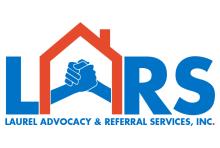LARS offers a number of emergency services to Laurel residents three days a week, including: short-term financial assistance to prevent evictions and utility stoppage; assistance with security deposits and first month’s rent; vouchers for eyeglasses, hearing aids, clothing and furniture; referrals for shelter; and a food pantry which can be utilized by clients every 30 days. LARS has limited funds to assist homeless clients with obtaining ID cards and birth certificates, prescriptions and ... Läs mer
LARS offers a number of emergency services to Laurel residents three days a week, including: short-term financial assistance to prevent evictions and utility stoppage; assistance with security deposits and first month’s rent; vouchers for eyeglasses, hearing aids, clothing and furniture; referrals for shelter; and a food pantry which can be utilized by clients every 30 days. LARS has limited funds to assist homeless clients with obtaining ID cards and birth certificates, prescriptions and other minor health expenses, drug treatment, and mental health needs. A bilingual case manager is available to help facilitate services provided to the growing Hispanic population in Laurel. LARS also strives to make federal programs accessible to clients who lack transportation to larger social service hubs. Once a week, LARS hosts a representative from the Prince George’s County Department of Social Services who is available to assist clients with submitting applications for SNAP benefits (food stamps). LARS has partnered with many such organizations, including the Capital Area Food Bank and the Department of Veterans’ Affairs to provide local access to needed services.
LARS also operates supportive housing programs for chronically homeless and disabled families and individuals. The Transitional and Permanent Supportive Housing Programs provide subsidized housing and supportive services to clients living in local apartments leased by LARS. Referrals for these programs come directly from Prince George's County's coordinated entry system.
As part of its strategic plan for the next five years, LARS has refocused its objectives to align more closely with its founding mission – to not only help people in crisis achieve stability, but also to provide resources that build skills for self-sufficiency. While we continue to recognize the need for short-term emergency services, our long-term goals address the underlying causes of crisis and will create sustainable change in the lives of those we serve. To this end, LARS staff is developing a working model for a Self-Sufficiency Program, based on the Bridges to Self-Sufficiency/Mobility Mentoring models developed by Crittenton Women’s Union (Boston, MA). Through this program, to be piloted in Spring 2016, stabilized and motivated clients will work closely with a LARS case manager to maintain permanent housing, improve financial habits, gain employment, and remove other barriers to self-sufficiency. Many elements of LARS’ supportive housing programs will be integrated into this new program, allowing us to offer the benefits of long-term case management to our larger client base.
Dölj fulltext